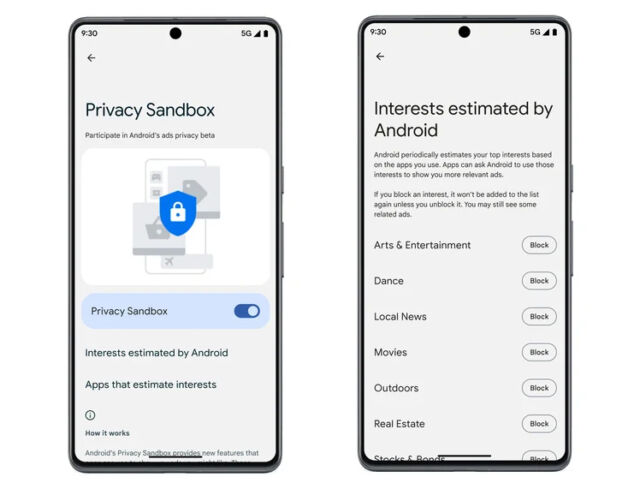
Apple blew up the advertising market in 2020 when it gave tracking an opt-in feature on iOS. Since then, Google—the world’s biggest advertiser—has been slow to roll out its solution for Android and Chrome. The idea that Google has come up with is called the “Privacy Sandbox,” which sounds like a good thing, but it’s a new tracking system for Android and Chrome. Once that is up and running, only then does Google say it will start blocking existing tracking methods like third-party cookies.
The company’s latest progress report is that the Privacy Sandbox is coming to Android, in beta. Google says, “The Privacy Sandbox for Android Beta will roll out gradually, starting with a small percentage of Android 13 devices, and will expand over time. If your device is selected for the Beta, you’ll receive an Android notification letting you know.”
Privacy Sandbox, on Chrome and Android, tracks users by interest groups rather than individually, which Google claims is a privacy improvement. Android will soon build an advertising profile of you, and the user interface will let you block “interests” you don’t want to see ads for. There’s an off switch and a list of apps that plug into the new tracking system—presumably anything using a new build of the Google Ads API.

Another user tracking system on Android is no big change in the grand scheme of things because there are already advertising and targeting APIs in Google’s OS. Adding the Privacy Sandbox tracking system to Chrome is a far bigger change since that’s the first time an ad system has been built directly into Google’s browser. Google also wants to cripple ad blockers on Chrome sometime this year. Google makes about 80 percent of its revenue from advertising, so forcing ads into its browser and OS is one of the few things the company does that will affect its bottom line.
The “Privacy Sandbox” on Chrome has at least some roundabout argument for improving privacy, since Google claims it will one day block third-party tracking cookies in Chrome once the system rolls out. On Android, the Privacy Sandbox tracking is in addition to all the usual individual tracking methods; it’s not being pitched as an alternative to anything. The Privacy Sandbox on Android is toothless, and Google has no plans to reduce tracking on Android. The company said last year that “we plan to support existing ads platform features for at least two years, and we intend to provide substantial notice ahead of any future changes.” So even in the best-case scenario, Google has no plans to answer iOS’s 2020 tracking reduction until at least 2024.
https://arstechnica.com/?p=1917626

